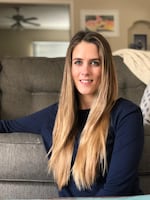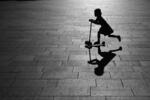For the last few months, we’ve been having a series of conversations about Oregon’s child welfare system, following a scathing audit. We’ve heard from administrators, caseworkers, critics and foster parents to try to get a handle on a really complex system. We’ve been asking how it works, where it’s failing and what it would take to fix it.
After talking so much about these young people in previous conversations, in this latest installment, we meet Portland teenager Rosie Gullett, who is currently in foster care, and Chérie Renee Hawes, a young woman who spent many years in Oregon’s child welfare system.

Chérie Renee Hawes grew up in Oregon's child welfare system. She calls herself a "foster child survivor."
Photo courtesy Chérie Renee Hawes
Chérie Renee Hawes, 30
Hawes said she was 5 years old when she stopped living with her biological mother who struggled with drug addiction. Hawes lived happily for a couple years after that with her mother’s mother. It was a warm and loving environment, she said. But her grandmother died of cancer, so she went to live with her uncle and his wife. And that was where her real troubles started.
"I was physically and emotionally abused by my aunt, the woman who was married into my family. It started pretty much right away. And it's scary and terrifying and you just don't know when the next abuse situation is going to happen,” she said.
Hawes said her aunt hit and choked her, sometimes as punishment for misbehavior, but sometimes with no provocation whatsoever.
“It was very scary and really lonely. I lived with my two younger cousins as well. She never hurt them," Hawes said. "It was all taken out on me."
The abuse went on for years before she confided in friends, who told authorities. Hawes then told a counselor about what she had experienced, and her aunt was arrested.
After that, Hawes bounced around — from a foster home, then a family friend, then back to her uncle (still married to her abuser) and then into the home of a couple near Silverton who were only expecting to be foster parents for a short time, but whom she would eventually call "Mom and Dad."
“I met them on one Friday and the following Friday I spent the night and following Friday I moved in,” she said.

Chérie Renee Hawes with her mom and dad, Frances and Phillip.
photo courtesy Chérie Renee Hawes
She was 11, almost 12, and scared — really scared — about what would happen next, she said, but eventually, she grew to trust them. They taught her to ride horses and provided her with love and support.
Things were good for a year or so, Hawes said, but then, like many young teens do, she rebelled. She took out much of her anger about her past trauma on her foster mom, Frances. Hawes calls that year of her life “my crazy year.” She said she started to harm herself and became suicidal. Oregon, she said, didn’t know what to do with her. Her foster parents, Frances and Phillip, told her they would remain in her life and advocate for her but she needed to get help before she could live with them.
“They had to, in a sense, give me up so that I could get help," she explained. "I was put into a different foster home for a few months. And then they said, ‘We'll put you in a shelter down by your mother and maybe you'll move in with your mother,’ which should have never been an option. My mother did not have her stuff together. But of course, I romanticized that idea because I loved my mother and wanted to live with her.”
Hawes described being taken to an evaluation center after that and given a variety of medications that she said only made her worse. She was there for three months, and the whole time Phillip and Frances were calling DHS and trying to get her out of that place.
“My foster parents kept saying, ‘No — get her off these drugs, get her the help she needs,’" Hawes recalled. "I was briefly put into another home before I was put in a live-in treatment facility for five months.”
Finally, she got the therapy and treatment she needed to be able to get healthy and move back in with her foster parents.
She still sees her biological mother from time to time, but she said she has a family and that’s her foster parents, Frances and Phillip. She had long thought of them as “Mom and Dad,” but it was only when she was in her mid-20s (about five years ago) that she actually started calling them that.
“I realized I had been doing it in my head," she said. "They are my mom and dad. I want to give that to them. I want to give that to myself.”

Rosie Gullett, 17, is the oldest of her biological parents' nine children.
Allison Frost / OPB
Rosie Gullett, 17
Rosie Gullett said growing up she didn’t know how unusual her living situation was but later heard it described as “a nomadic lifestyle, a hippie lifestyle.” It was more than unconventional and she later came to realize that it was unhealthy, even abusive.
“I was pretty much homeless living with my biological family. We traveled the United States. Mostly living in Portland but traveling around, living in different Volkswagens and RVs, going to music festivals and hippie communes.” She added with a deep, shaky sigh, “A lot of time running from the state and the law.”
Her first foster home was in Tennessee.
“I was 11. ... It was in Tennessee. And we had been living on the last hippie commune we had lived on and it had been raided by police, who came in and saw our living conditions — that we didn't have running water, we didn't have food, we were a family of, at the time, six kids and my parents, living in a tent and a trailer.”
Authorities in Tennessee separated the parents and the children. She and her siblings spent that night in a child welfare office.
“My dad had always expressed fears of something like that happening. He'd expressed the fears that ‘Oh, they're going to come take you from us. They’re gonna come take you.’ And for that to become a reality was genuinely terrifying,” Gullett said.
Related: 'I Was So Broken': 14 Years In Oregon's Foster Care System
The loss of everything they owned, she said, was a minor concern.
"We lost all our possessions. But that was common to us. Because, like I said, we were moving around a lot — a lot. Constantly being ready to be like: OK, time to go to the next town or the next state, and just be ready to have that bag that you're always able to carry and can throw in the car, 'cause here we go."
After the raid, the foster home in Tennessee in which she and her siblings were placed was a nightmare. Gullett said they weren’t allowed to talk about their biological parents at all.
“There was sexual abuse, there was forced religious practices," she said.
After a year or so, her parents got custody of their children and took them back to Oregon. Gullett may have wanted to let the child welfare system know she didn’t feel safe at home, but she said she felt so violated, isolated and alone, that it created a kind of hatred of authority that prevented her from reaching out to anyone. So, after a couple years, she ran away. She was missing on and off for nine months.
Gullett said she wanted to prove a point: “That the situation I had was so terrible, that I could live by myself, on my own as a 14-year-old and feel safer on the streets than in that home. I had more confidence in myself protecting myself than I did in the system that had already failed me.”
Eventually, she chose to go to Harry’s Mother, a youth shelter in Portland, and re-enter the child welfare system.
The foster family she is living with now are the parents of a friend she made when she was in kindergarten and with whom she had kept in touch over the years whenever the family would move back to Portland, which they did repeatedly, over many years.
“I chose to go into foster care so that I could get the rest of my siblings away from my biological parents,” she explained.
Gullett and her younger siblings are now living in three separate foster homes.
Both Hawes and Gullett described their relationship with caseworkers as difficult at best. Gullett said she could rarely even reach her caseworkers.
“The way the system has been treating me over the past two years — it's definitely been the best I've ever received, but it doesn't feel like enough,” Gullett said.
Hawes said it was her foster parents who had the most interaction with caseworkers. But even though they felt let down by the system, they both said they empathized with the caseworkers.
“They have so many children,” Hawes said. “And I feel bad because they don't have the resources to be able to give the kids what they need.”
Hawes said she and Gullett have had to be self-reliant.
“One-hundred percent. You have to want to do it for yourself," Hawes said. "You have to have that love. And it's hard. When you come from places like Rosie and I, it is really hard to find that. But it's easier when you do have the space for people who do want to love you and advocate for you.”
Gullett said she appreciates the advocates she does have in her life and what she calls the blessing of health care, which she never had growing up. She has health and dental insurance on the Oregon Health Plan until she’s 26, nearly 10 years from now. She hopes that somehow by sharing publicly what happened to her, she can help change the system for the better.
Hawes started writing a blog in 2016 and wants to share her experience as widely as possible.
"I really truly believe that knowledge is power. And like Rosie said, we have to be the ones to help make that difference," Hawes said. "And so, I just want to share my story for current foster kids, parents, anybody going through — even if you're not in foster care — but if you're going through something difficult, you can get off that negative path and you can be the best version of yourself and be happy and be loved. And that's why I'm sharing my story."

Young girl on scooter. Photo illustration used with permission.
Marvin Girbig/Flickr
'Think Out Loud' On Oregon's Child Welfare System
You can read all of the articles and listen to the conversations in this series here:Part 1: How a Landmark Audit Could Change Oregon's Child Welfare DepartmentPart 2: Oregon Child Welfare Workers Say They Can't Keep Up, Do Prevention WorkPart 3: Former Child Welfare Director: DHS Must Reprioritize PreventionPart 4: Past And Present Foster ParentsPart 5: Stories From Inside Oregon's Troubled Foster Care SystemPart 6: Improving Legal Representation And Outcomes For Foster KidsPart 7: Contrasting Political Takes On Reforming The System
